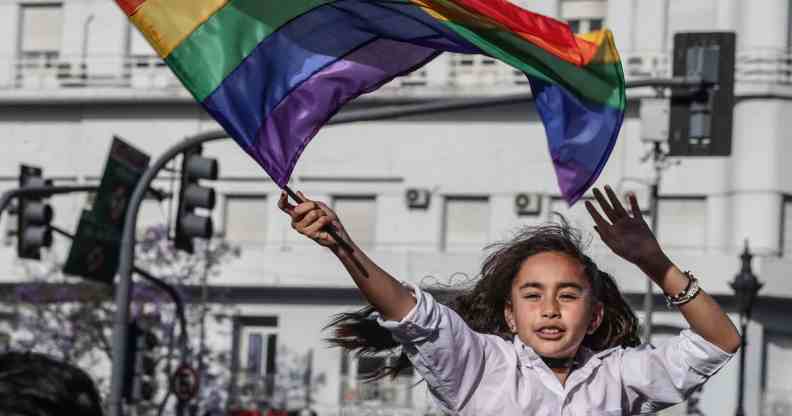Buenos Aires officials sued over unjust ban on gender-neutral language in schools

A reveller takes part in the 30th Pride Parade in Buenos Aires city, on November 6, 2021. (Photo by ALEJANDRO PAGNI / AFP) (Photo by ALEJANDRO PAGNI/AFP via Getty Images)
Authorities in Buenos Aires are being sued after banning gender-neutral language from being taught in schools.
Local officials were collectively taken to court by political groups after they banned teachers from describing students as “chic@s, “chiqxs” or “chiques”.
Groups including the Argentinian LGBT Federation called the decision a “violation of human rights”, saying that the move excludes gender-nonconforming individuals in classrooms.
The Telegraph reported that Argentinian LGBT Federation founder Maria Rachid said: “The city government could not explain how the prohibition of the use of non-exclusive language in schools would violate city and national laws.
“We are completely convinced that we are going to win this case,” she continued.
Officials have claimed that the terms are confusing for children and argued they could be linked to a recent drop in exam results but have cited no specific research towards the claim.
Despite the restrictive enforcements, teachers across Buenos Aires, including a transgender teacher from the Palmero neighbourhood, have vowed to continue using inclusive phrasing despite the threats of disciplinary action.
According to The Telegraph, Argentina’s national education minister called the ruling sexist, unjust and comparable to the left-handed bans under Franco’s military dictatorship in Spain.
The South American country initially rolled out its gender-neutral markers on passports and national identity documents in 2021, with president Alberto Fernández demanding respect for non-binary individuals.
“There are other identities besides that of man and woman, and they must be respected,” he said at a ceremony in Buenos Aires. His ruling allowed individuals to use an ‘X’ marker as opposed to a binary gender signifier for their identity documentation.
According to the decree published in Argentina’s official gazette, it was introduced for any Argentinian who “does not feel understood under the male/female binary”, including non-binary, intersex, and gender-diverse people.
President Fernández continued: “The ideal will be when all of us are just who we are and no one cares about people’s gender. [There are a] thousand ways to love, be loved, and be happy.”
It was the first Southern American country to introduce gender-neutral signifiers, which was hailed by activists calling it a “historic breakthrough and saying Argentina remains at the “forefront of respecting human rights”.

